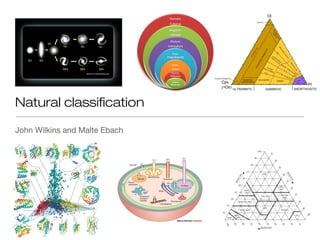
Natural classification
- 1. Natural classification John Wilkins and Malte Ebach
- 2. • “All science is either physics or stamp collecting!” • Two responses: • 1. Actually other science is also like physics: Physics envy • 2. Stamp collecting is valuable • I want to discuss the history of these views and argue that we need natural classification to make sense of that history and modern science Rutherford's dictum
- 3. • Scientific ontology is derived from theory • "Theory is not solely an economical representation of experimental laws; it is also a classification of these laws" (Duhem 1914 23) • "When the zoologist asserts that ... a classification is natural, he means that those ideal connections correspond to real relations among the associated creatures brought together and embodied in his abstractions" (25) • Classification is held to be an intellectual operation on abstract ideas. • Since theory is self-standing, the only ideas that matter are theoretical • Similar views held by Kuhn, Lakatos and Popper • Two schools: • Evolutionary conventionalism • Philosophical theory-derivation The standard view of classification:
- 4. • Although Darwin was a standard systematist (Strickland Code), his ideas were immediately thought to undercut taxa • If species evolve, then they are not real • We classify based on "evolutionary novelties" • By the sesquicentenary of the Origin, the standard view was that classification was a matter of convenience (Conventionalism) • Colloquium in American Naturalist in 1908, Botanical Society of America meeting Darwin and the decline in systematics
- 5. • From c1900, philosophy moves away from evolution and natural classification • John Dewey reduces classification to librarianship • Russell and Moore reject evolution philosophically • Classification becomes a matter of our best theory and convenience • F. P. Ramsey suggests we formalise theories as logical sentences • Hence, an object exists so long as it is the kind of thing that can be represented as a variable in that logical (or Ramsey) sentence: • Quine's slogan: "To be is to be the value of a variable" ("On What There Is", 1948) • This is an essentialism: the ontology of a theory is the definitional essences deduced from the variables of the theory Philosophy and classification
- 6. • Obviously, biological sciences classified from the beginning • We still recognise, e.g., species defined in the 16thC by Bauhin, Gesner and others, well before any theory • While Linnaeus's scheme was not meant to be "natural", natural classification was the goal in the late 18thC to early 19thC • Adanson • A. L. de Jussieu • W. S. Macleay • Whewell • Not just in biology, though... What is wrong with this?
- 7. • Mineralogy (Mohs, Linnaeus) • Chemistry – elements, atomic weight, spectrum analysis • Leading to an empirical periodic table • Medicine - classifying disease • Psychology • DSM - etiology versus phenomenology • Earth sciences • Rock types • Soil types • Ecology • Ecotypes • Biogeographical regions (Wallace) Classification in the other sciences
- 8. • The problem of theory-dependence of observation • Can naive observation happen? • Nobody starts by knowing nothing; no tabula rasa • Prior knowledge: • Folk science and taxonomy • Linguistic categories • Psychological dispositions • Berlin's Five level theory • Evolutionary psychology • Kantian synthetic a prioria are evolutionary a posterioria – Lorenz • Is any of this theory? Natural classification and observation
- 9. Theory-relativity • A theory is relative to a domain of investigation • If the domain lacks a theory, it does not mean we have no theory • For example, did Galileo's observation of the moons of Jupiter need the theory of optics? (What about children that could see them with the naked eye?) • So is "naive" observation possible? • Platnick and the spinneret • The five year old test
- 10. • Conceptual • Passive (classification) to active (theoretical explanation) • Empirical • Passive (naive observation) to active (experimental intervention) • Rather than a set sequence or algorithm of discovery (“scientific method”), this sets up a field of possible steps and activities for a researcher, research group, program or discipline • Individually, each active researcher, etc., will strive to balance promising activities against costs and likelihoods of success • In a field that has elaborate successful theories, naive classification will be deprecated Science as a field of opportunities
- 11. B: Baconian induction P: Popperian GTR
- 12. Exp Cla Obs The Exp Revision and correction 3. Experiment can suggest classification category 11. Experiment can restrict or guide “naive” observations 2. Experiment can restrict theoretical range, or disconfirm theory Cla 4. Classification can suggest things to measure and expect Revision and correction 5. Classification can guide the evidence sought 10. Classification can restrict or guides the ontology of a theory and the explanatory categories used Obs 12. Naive observation can influence the data used in experiment 6. Classification can be based on naive observations made pretheoretically Revision and correction 7. Theoretical predictions can fail to be borne out in observation The 1. Theory can specify legitimate experimental protocols and 9. Theoretical variables can become classification 8. Observation can depend upon the ontology and methodology of a Revision and correction
- 14. Some principles • Classification sets up the explicandum that theory explains • Theory can change a natural classification via iterative refinement (reciprocal illumination) • Observation can be domain-theory-free and therefore “naive” • Everyone has some knowledge prior to investigation • Some observation is theory-dependent • There is no set sequence for a domain’s development: it depends upon the broader discipline and how it is located within science generally
- 15. Science is a Dance Floor There’s room for everyone
- 16. “OK, let’s slowly lower in the grant money.”
